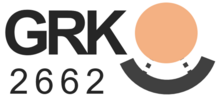
"Charging into the future": Understanding the interaction of polyelectrolytes with biosystems
International Research Training Group GRK 2662
The DFG-funded International Research Training Group GRK 2662 aims for a better understanding of the molecular interactions between polyelectrolytes such as DNA, proteins or heparin with complex biological systems. Key to this is a close collaboration between researchers at Freie Universität Berlin (Germany), McGill University, Montréal, and the University of British Columbia, Vancouver (Canada), who share complementary expertise.
Focus
Polyelectrolytes are linear or branched macromolecules onto which charged units are appended. Natural polyelectrolytes such as DNA, proteins or heparin play a central role in virtually all biochemical processes. A quantitative understanding of the forces leading to binding of polyelectrolytes to biomolecules is of central importance for a variety of problems, for instance a rational design of therapeutic lead structures.
Research at Freie Universität Berlin is mainly focused on fundamental physical and chemical issues and therefore aims to understand interactions between polyelectrolytes with biosystems. The Canadian side will use the gained knowledge to tackle questions of direct pharmaceutical importance. Based on this, the research projects of the IRTG are arranged along their chemical and biological complexity in a two-dimensional matrix comprising three themes: “Polyelectrolyte - biomolecule interactions” is devoted to basic questions and modelling. “Cellular interactions with polyelectrolytes” focuses on the interaction of polyelectrolytes with more complex systems including neuronal cells. “Polyelectrolyte interactions in complex environments” constitutes the highest level of complexity including inflammatory diseases and blood interactions.
The IRTG will provide a well-structured training program to young doctoral researchers, which is organized along the research themes and is coordinated by leading interdisciplinary researchers with strong track records. The program is integrated in the doctoral program “Natural Sciences”, which is part of the Dahlem Research School (DRS). Our IRTG will allow trainees to benefit from top interdisciplinary bilateral qualification and acquire international research experience by six months’ research visits. In addition, they will receive excellent training by specific lectures, workshops, annual symposia, and industry collaborations.
| Contact Information | |
|---|---|
| Chair: |
Prof. Dr. Rainer Haag (Speaker) Prof. Dr. Kevin Pagel (Co-Speaker) Freie Universität Berlin |
| Coordinator: |
Dr. Svenja Herziger Freie Universität Berlin Arnimallee 22 14195 Berlin |
| Telephone: | +49 30 83865340 |
| E-mail: | office@irtg2662.de |
| Web: | http://www.irtg2662.de/ |
| Deadlines: | vacant positions will be announced on the website |
| Places: | 16 Doctoral positions over the next 4.5 years |
| Scholarships: | -- |
